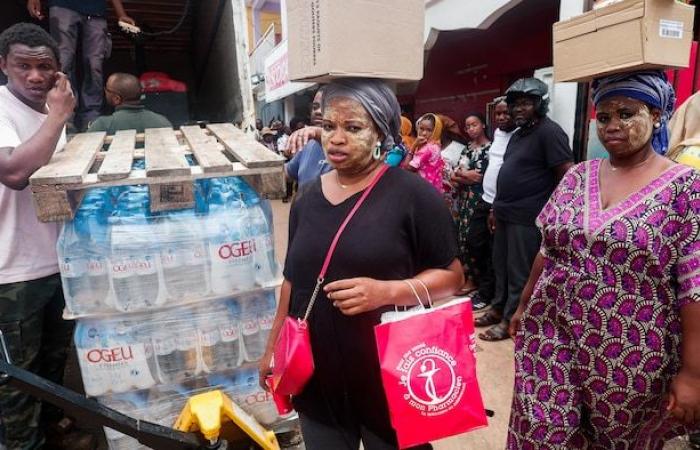“We are thirsty. We are hungry”: faced with aid arriving in trickles, the inhabitants of Mayotte are growing impatient despite the return of running water supply in the capital of this French archipelago in the Indian Ocean a week later the devastation wreaked by Cyclone Chido.
On this first day of the weekend, many residents are queuing in front of ATMs or at the checkouts of supermarkets which are starting to reopen, as are several gas stations.
Although emergency aid is still awaited in several places in the archipelago, water was distributed in Mamoudzou and many residents returned home, a pack of bottles held at arm's length or on their heads, noted Saturday morning a journalist from theAFP.
Open in full screen mode
Women carry boxes as people gather at a supermarket recently stocked with food and water.
Photo : Reuters / Gonzalo Fuentes
Until December 27, households in Mamoudzou will only have access to water for eight hours – two days out of three – while outside temperatures exceed 30 degrees Celsius.
President Emmanuel Macron had promised Friday evening the connection, at least partially, of homes to water from Saturday after having been exposed for two days to the distress of the Mahorais.
Although he assured several local media that he appeared the emergency
the head of state also warned that for months, Mayotte will not live in a normal situation
.
In terms of emergency accommodation, theONG Acted said in a statement on Saturday that it chartered a special cargo plane to transport
towards the archipelago a first batch of 700 tents which should be [installées] on the ground for Christmas Day
in order to accommodate nearly 5000 people […] in the most destroyed territories
.
In Mayotte, the provisional toll from the cyclone stands at 35 dead and 2,500 injured, including 78 seriously, according to the latest figures from the Ministry of the Interior.
However, it is likely that there are many more victims
recognized Emmanuel Macron, recalling that a mission had been carried out to establish an exact assessment.
The cyclone also caused other victims in southern Africa: 76 deaths in Mozambique and 13 in Malawi, according to the latest reports.
In the La Geôle district, in Mamoudzou, Shalima took advantage of this first day of water at the public pumps on Saturday to come with other women to wash her clothes in a parking lot.
We took everything that was flooded and came to wash it
said this 30-year-old shopkeeper, a large basin of clean water and a small one for washing next to her. It's good for morale, because the clothes we have here are the same ones since last Friday. The next step is being able to eat. They bring us a sandwich a day, but it's not enough
says this woman, who has not seen any state representative since the cyclone.
In this mixed neighborhood of precarious housing and concrete houses, Adjilani Asadi has not seen any civil servant in a week either: We drink the water from the cisterns, but it is salty. There is no choice, otherwise we will die.
Those who lived in tin shacks have already rebuilt theirs. Unlike slums like Kawéni, there is more space here and some look like real households.
In public order, for the moment, things are completely contained. The Mahorais are not engaged in actions of violence, looting
underlined Saturday to theAFP the public prosecutor of Mamoudzou, Yann Le Bris.
On Friday, Emmanuel Macron went to Tsingoni, a landlocked town in the west of Grande-Terre, the main island of the archipelago. Far from Mamoudzou, help, water, electricity and food were always slow to arrive.
Already, 80 tons of food and 50 tons of water were distributed in nine municipalities yesterday
the resigning Minister of the Interior Bruno Retailleau indicated on Friday, assuring that everything is in place to distribute 600,000 liters of water per day
or a little less than two liters per person.
Around a third of the population of Mayotte, or more than 100,000 inhabitants, particularly people in an irregular situation from neighboring Comoros, live in precarious housing.
End
to the slums and DELETE
ces habitats unworthy
et dangerous
is one of the objectives of the special law promised by the president to rebuild
Mayotte. Prime Minister François Bayrou has set a potential deadline of two years for this reconstruction.






